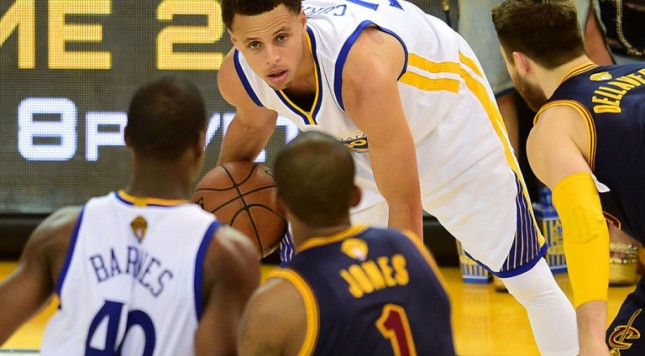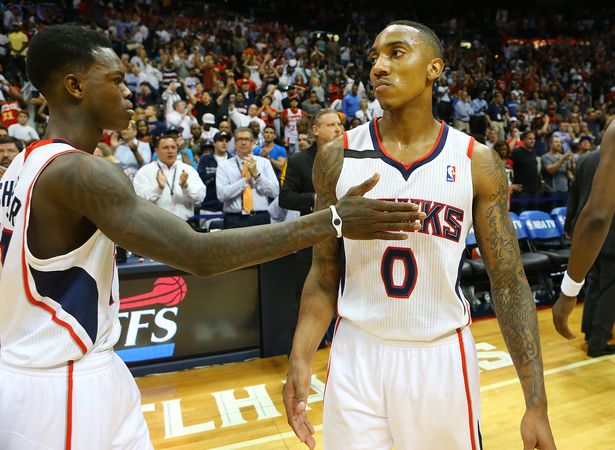Kyrie Irving won’t play for the rest of the 2015 NBA Finals. That news came down Friday afternoon, giving the Cleveland Cavaliers roughly 48 hours to prepare how to play in his absence. No one’s going to say that this is good news for Cleveland — not in light of the way Kyrie performed in Game 1 — but at the very least, the Cavs will gain more time in which to adjust to their suboptimal situation.
Since there’s a two-day break between Games 1 and 2, as opposed to the one-day break that will exist between Games 2 and 3 and (then) 3 and 4, Cleveland head coach David Blatt has at least some added time to map out his rotations and his tactics. Had Kyrie gotten injured in Game 2, Blatt and his staff would have had far less turnaround time before the next contest in this series. Under these circumstances, Cleveland can line up its chess moves a little more and consider its options. Such is the fascinating subtext to Game 2 on Sunday evening in Oakland.
What are the consequences of Kyrie’s injury? Immediately, two players we’ve profiled at Crossover Chronicles this past week — Matthew Dellavedova and the never-boring J.R. Smith — will become more prominent and necessary for the Cavs. So will Iman Shumpert. So will James Jones, albeit to a much lesser extent than Delly, Shump, and J.R.
In the midst of all these changes, many obvious questions emerge, the central one being: “How must Cleveland’s approach change with its adjusted lineup?” In answering this question, the realization emerges: Losing Kyrie, while not a welcome development, should certainly not be seen as the death-knell many fans instinctively think it is for the Cavs.
In order to understand this, you only need to look at Cleveland’s previous two playoff series.
*
While the Golden State Warriors would clearly rate as a much better team than both the Chicago Bulls and Atlanta Hawks, both Chicago and Atlanta have something in common with the Dubs: They don’t have a formidable low-post scorer, at least not someone you just dump the ball to with his back to the basket and allow him to operate. Chicago’s Pau Gasol and Atlanta’s Al Horford possess some back-to-the-basket capabilities, but they made more of an offensive impact in the playoffs as 18-foot mid-range shooters, especially from the top of the key. Chicago, with Nikola Mirotic, Joakim Noah, and Taj Gibson — simply didn’t generate much scoring off dump-downs into an isolated low post. Neither did Atlanta with Horford and Paul Millsap. Each of these players being named did more from face-up positions, and that’s where we bring Golden State into this discussion.
Draymond Green can operate in the low post on offense if the matchup is right for him, but that’s certainly not the case in this series. Tristan Thompson is more than physical enough to handle him, and if Steve Kerr wants to go with the small-ball “Draymond at center” lineup, the Cavs could go big with Tristan (we’re going to use his first name because there’s another Thompson in the series, Klay of the Golden State team…) and Timofey Mozgov, who was excellent in Game 1 on Thursday.
Draymond did not generate much of any low-post, back-to-the-basket offense in Game 1, and teammate Andrew Bogut was very shaky in terms of finishing near the rim. Bogut at one point gave up a layup to try for a three-pointer (by passing to a teammate on the perimeter). Golden State is not a team that’s going to beat an opponent with low-post offense. You want that? Go to Blake Griffin, Tim Duncan, Dwight Howard, or the Memphis Grizzlies.
To draw everything together, it has to be said that since Kyrie missed (or was barely healthy for large portions of) the Chicago and Atlanta series, Cleveland’s constant success in defending the Bulls and Hawks should be looked at by the Warriors. Cleveland responded to the loss of a dynamic offensive player by getting better on defense. This has been David Blatt’s most important contribution to Cleveland’s big playoff run: He has emphasized defense and given his players a good plan in each series.
When you look at the three Cleveland players — Delly, Shumpert, and J.R. — which will now bear an even greater workload in this series, it’s easy to move J.R. to the side. This is not done out of disrespect, but because you always know he’s a bit of a wild card. Smith is going to take every shot he can get his hands on, and some of them will be contested. He’s going to need to make an appreciable percentage of them for the Cavs to space the court and take some heat off LeBron James. That’s J.R. Smith in every game.
The two mystery players on the Kyrie-free Cavs are Dellavedova and Shumpert. These are the men who have played huge roles in helping Cleveland to reach the Finals. Given an extra day of rest by the schedule-maker, they have to be ready to play extended minutes in Game 2. More specifically, they have to be able to play valuable defensive minutes when Stephen Curry and Klay are on the court.
This is where one of Game 2’s most central tension points comes into focus.
*
If Cleveland’s outlook has changed without Kyrie, it has changed in this respect: The Cavaliers must now aim to shut down Golden State’s offense. This seems simplistic, but with Kyrie on the floor and creating offense for his team, it was a lot easier for the Cavs to try to beat Golden State by emphasizing their advantages at the offensive end of the floor. Game 1 brought to mind a classic answer to an age-old question:
How do you stop LeBron James in one-on-one situations?
Score at the other end.
The Warriors watched Curry and Klay hit a combined 5 of 15 threes, but accumulated contributions from Andre Iguodala and Marreese Speights made up the difference just enough to deliver a victory on a night when Kyrie scored 23. Now that Kyrie’s out, Cleveland has even less reason to feel it can win a track meet. The Cavs, who allowed 98 to Golden State in regulation on Thursday, realistically need to get that number down to the low 90s at minimum and ideally in the high 80s.
This is what a Kyrie-free Cleveland team did to Chicago and Atlanta on multiple occasions.
Yes, it’s true that Golden State has better shooters than Chicago, and comparable shooters when matched against Atlanta. However, one of the fundamental realities of good defense is that it anticipates various offensive actions to the extent that defenders beat offensive players to spots. You don’t have to be quicker than the other guy; you just have to know where he’s going. This illustrates how Cleveland dismantled Atlanta’s offense in the Eastern Conference finals.
In the photo one paragraph above are Jeff Teague and Dennis Schroder. They’re Atlanta’s two really fast point guards — they’re faster than the Splash Brothers are in terms of pure footspeed and getting to the rim on a timed stopwatch. However, Cleveland thwarted Teague and Mr. Umlaut because they beat the Hawks to spots all series long.
The key detail to add to that last sentence is this: The Cavs beat the Hawks to spots all series long with Dellavedova and Shumpert leading the charge.
This is how Game 2 is likely going to be decided… at least in the realm of non-LeBron-based reasons.
Cleveland’s defense was so much more coordinated and fluid with Delly on the court instead of Kyrie — this is partly due to injuries, but it’s also a product of Delly’s defensive instincts. Shumpert is an established defensive player whose main question mark is his jump shot (a shot which has gotten better in these playoffs, a key source of Cleveland’s success). When you watch Game 2, look at how Delly and Shump guard the perimeter. See how well they do (or don’t) maintain a minimal distance from the Splash Brothers and crowd their shots. If they succeed in continuing to disrupt Steph and Klay, Cleveland — using its big lineup with Tristan and Mozgov — can handle Golden State’s offense to the extent that it won’t need an offensive flurry of its own.
To put the matter more comprehensively: If Delly and Shump can play lights-out defense, and J.R. can produce the One Really Big Game he seems to find each playoff series, Cleveland will find the balance of non-LeBron offense and all-around defense it needs to square this series at a game apiece.
No Kyrie, no hope? If you’ve watched Cleveland over the past four weeks, you know that’s not really true.


